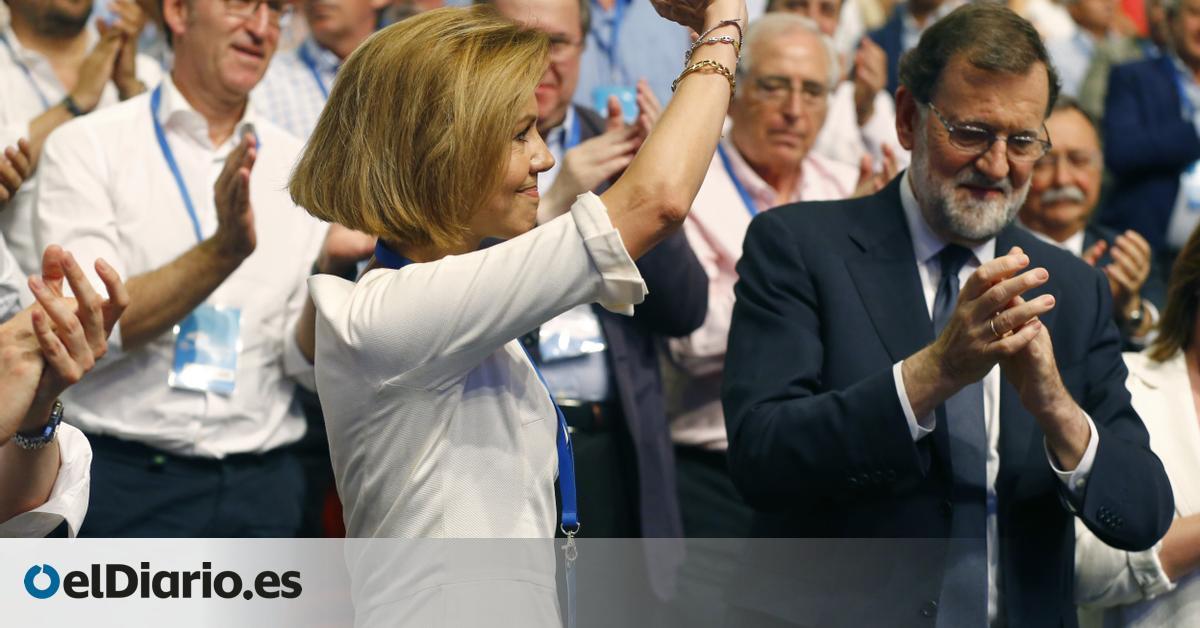
The letter from the Anti-Corruption Prosecutor in the Kitchen case is projected on two relevant levels: the most visible, with the request for a prison sentence for a minister of the Interior for the second time in democracy, and another, more difficult to perceive and that makes it clear that not all those responsible for the operation will sit on the bench.
The false priest who assaulted the house of Bárcenas: alone or at the orders of others?
Further
The decision of the National Court to save María Dolores de Cospedal from the trial and not to investigate Rajoy has forced Anti-Corruption to limit the plan to destroy evidence harmful to the PP to the leadership of the Ministry of the Interior in 2013, but with a message attached : “Without the possibility of ruling out the intervention of other people from different instances”.
The prosecutor Miguel Serrano has already left another statement, one of the harshest that has been made against a judge of the National Court, which helps to understand the previous one. It was September 2021 and the prosecutor was appealing the case file for Cospedal. Referring to the “political connection” of the Kitchen operation, Anticorruption stated: “There is a resounding negative [del juez Manuel García Castellón] to continue investigating in that direction, as if a cordon or unacceptable red line had been established that could not be crossed in the investigation”.
Twenty-five years have passed since prosecutor José María Luzón – father of the current head of Anti-Corruption – requested 23 years in prison for another Interior Minister, José Barrionuevo, also for embezzlement. Now, Jorge Fernández Díaz faces 15 years. He is also accused of embezzlement, but the difference is that the accusation against the socialist was accompanied by other more serious crimes related to the kidnapping of Segundo Marey by the GAL. The relationship between one case and the other appears in the absences section: Did the Interior Ministers act behind the backs of their superiors, in Moncloa or in the party?
Jorge Fernández Díaz belonged to the hard core of President Rajoy in that first legislature. Judge García Castellón made a feint of investigating the possible relationship between Commissioner José Manuel Villarejo and the President of the Government through a mobile number provided by the police officer, but he soon gave up. It was useless for Villarejo and the commissioner García Castaño to ensure that Rajoy was promptly informed through the Executive of Atresmedia Mauricio Casals. Nor that Internal Affairs identified El Barbas or El Asturiano in their reports as Mariano Rajoy, someone familiar with the operation, according to what Villarejo said in the recordings and ratified by his interlocutors.
More and stronger evidence was accumulated against María Dolores de Cospedal. They appear in her relationship with Villarejo, which goes back to the beginning of the Gürtel case and their secret meetings on the seventh floor of Genoa, very close to Rajoy’s office. There, in 2009, she agreed with her husband, businessman Ignacio López del Hierro, to entrust “specific jobs” to the policeman accused of leading a criminal organization while he was active, according to the published recording.
Later, in the midst of the outbreak of the box B scandal, he warned the commissioner of his desire to “stop the booklet”, in relation to the Bárcenas papers, the main proof of the irregular financing of the conservatives for two decades, according to the recording. published by El País in May 2022.
The relationship between the political leader and the curator was framed, however, in “social” uses, according to García Castellón. The notes in the policeman’s diary, which included payments and demands for arrears to the general secretary, end up supporting the story of Cospedal’s participation in an operation in which he was doing a lot: Rajoy and she herself appear as recipients of black money of the box in the Bárcenas papers, “the little notebook”.
But this Friday, the Criminal Chamber aligned itself with García Castellón and rejected the appeals that PSOE and Podemos had filed against the decision of the investigating judge to charge Cospedal again, to which Anticorruption had joined, according to the new published audios. It has not served either so that, added to the rest of the indications, García Castellón first, and the Criminal Chamber later, decided to re-indict the former general secretary of the PP.
According to the indictment of the Prosecutor’s Office, also known this Friday, the Kitchen operation had “the purpose of preventing all this material, incriminating for the PP, and the leaders that could be investigated, from being formally provided” to the court that was investigating the box B. The account imposed by the National Court adds that no one above Jorge Fernández Díaz knew about the operation, that the minister did not receive orders from anyone, that no other information service other than the Police was aware of it.
The repeated shadow of the CNI
The investigation of the Kitchen case has left numerous indications to suspect that this is not the case. One of those in charge of pointing out these indications was the one considered by the “coordinating” judge of the operation, Francisco Martínez, former Secretary of State for Security, for whom the Prosecutor’s Office requests 15 years in prison. In a reflection that the Police took from his phone, Martínez said: “My biggest mistake was being loyal to miserable people like Jorge [Fernández]Rajoy and Cospedal”.
On a voluntary basis, Martínez included in a notary record a message with Fernández Díaz in which they alluded to the “cecilio contact”, a police expression to refer to the agents of the Center. And involuntarily, when he wrote a reflection on his phone, without knowing that it would later be seized, in which he alluded to the involvement of other “State services.”
The Prosecutor’s Office always suspected that the CNI could be behind the assault on the Bárcenas’ house by a false priest, a habitual criminal almost destitute, who came to have two consecutive paid lawyers during the process that led him to jail. Very interested in the line of investigation of the false priest, one day García Castellón decided that it was over: he was taken in an ambulance to the National Court and there a coroner, different from the one who had visited him in prison, concluded that he was not in conditions declare. Enrique Olivares died in prison in January 2022.
A parallel Kitchen in prison
The persistence of Anticorruption has managed to include in the account of the facts a second Kitchen operation, almost parallel, carried out inside the Soto del Real prison. There, Bárcenas suffered the theft of documentation and the manipulation of a cellmate who, on leave, was going to access the cloud where the former treasurer allegedly kept incriminating conversations for Rajoy Javier Arenas.
Prosecutors hold Jorge Fernández, Francisco Martínez and policemen Eugenio Pino –former deputy director of operations–, Enrique García Castaño and Andrés Gómez Gordo responsible for this parallel operation in prison. But also, again, “to people who have not been identified so far.”
The rejection of the Criminal Chamber to the appeals of the accusations leads to the opening of an oral trial by García Castellón, a decision that can no longer be appealed. Meanwhile, and also during the hearing, if defendants such as Jorge Fernández or Francisco Martínez have evidence against other superiors, they have time to show it and seek an agreement with the Prosecutor’s Office that would reduce their eventual sentences.
–––––––––––
Before you stop reading…
elDiario.es is financed by the contributions of 60,000 members who support us. Thanks to them, we can write articles like this one and that all readers – including those who cannot pay – have access to our information. But we ask you to think for a moment about our situation. Unlike other media, we do not shut down our journalism. And that makes it much more difficult for us than for other media to convince readers of the need to pay.
If you get information from elDiario.es and you believe that our journalism is important, and that it is worthwhile for it to exist and reach as many people as possible, support us. Because our work is necessary, and because elDiario.es needs it. Become a member, become a member, of elDiario.es.
Source: www.eldiario.es

